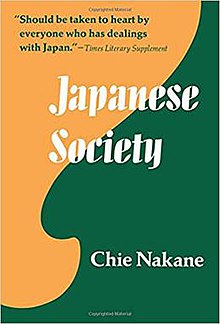 | |
| Author | Chie Nakane |
|---|---|
| Language | English |
| Genre | Sociology, Anthropology |
| Publisher | Pelican |
| Publication date | 1970 |
| Publication place | Japan |
| Media type | Print (Paperback) |
| Pages | 162 |
| ISBN | 978-0-14-021682-0 |
| OCLC | 1023276 |
| Dewey Decimal | 309.1/52/04 |
| LC Class | HN723 .N31513 1973 |
Japanese Society (1970) is an analysis of the structure of Japanese society, written by Chie Nakane. The main theme of the book is the working of what Nakane calls "the vertical principle" in Japanese society, which is a series of social relations between two individuals, one of whom is senior and one of whom is junior.
Nakane also formulates the criteria of 'attribute' and 'frame' to illuminate that way that groups are formed in Japan, and to compare Japan with other countries. Her thesis is that 'frame', which is circumstantial and may be "a locality, an institution or a particular relationship which binds a set of individuals into one group, is more important that 'attribute', "which may be acquired not only by birth but by achievement", examples of which include "a definite descent group or caste". This situation is contrasted with India.
See also
Notes
- The Asahi Shimbun (2021-11-09). "Vox Populi: Chie Nakane's grim assessment of Japan society still valid today". Asahi. Retrieved 2022-07-08.
- ^ Nakane, Chie: "Japanese Society", page 1. Pelican, 1970.